
ECONOMIST-NETHERLANDS
Scope & Guideline
Navigating the Complexities of Economics with Expertise
Introduction
Aims and Scopes
- Economic Analysis and Policy Evaluation:
The journal publishes studies that critically analyze economic policies and their effects on various sectors, particularly in the context of the Netherlands, often employing quantitative methods and empirical data. - Labor Market Dynamics:
A significant focus is placed on labor market issues, including employment trends, wage differentials, and the effects of economic policies on job creation and skill development. - Social and Behavioral Economics:
Research exploring the relationship between economic decisions and social factors, such as education, trust, and demographic influences, is a core area of interest. - Pension Systems and Reforms:
The journal contributes to discussions on pension systems, examining the impacts of reforms and the behavior of pension participants in the context of Dutch policies. - Migration and Integration Economics:
Studies addressing the economic implications of migration, including labor market integration and the impacts of educational policies on migrant populations, are also prevalent.
Trending and Emerging
- Impact of COVID-19 on Economic Behavior:
A notable trend is the examination of the COVID-19 pandemic's effects on various sectors, including labor market fluctuations and shifts in consumer behavior, highlighting the pandemic's long-lasting economic implications. - Digital Economy and Technological Change:
Research exploring the implications of technology on labor markets, particularly regarding remote work and digital skills, is gaining prominence as the economy evolves in response to technological advancements. - Wage Inequality and Labor Market Disparities:
There is an increasing focus on the dynamics of wage inequality and the factors contributing to disparities in the labor market, reflecting broader societal concerns regarding equity and fair compensation. - Policy Analysis on Migration and Integration:
Emerging studies are increasingly addressing the economic impacts and policy implications of migration, especially in light of changing demographics and labor market needs in the Netherlands.
Declining or Waning
- Environmental Economics and Sustainability:
While earlier publications examined environmental impacts and sustainability, recent titles suggest a waning interest in this area, possibly due to a shift towards more immediate economic concerns post-COVID-19. - Consumer Behavior in Traditional Markets:
Research focusing on consumer behavior in traditional retail markets has decreased, potentially reflecting the growing dominance of online and digital shopping trends, which have taken precedence in more recent studies. - The Role of Sports Economics:
Although earlier years showcased several papers on the economic aspects of sports, this theme appears to be diminishing as the journal increasingly prioritizes more pressing economic and labor market analyses.
Similar Journals
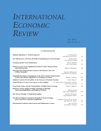
INTERNATIONAL ECONOMIC REVIEW
Exploring the forefront of economic research since 1979.INTERNATIONAL ECONOMIC REVIEW is a prestigious journal dedicated to advancing knowledge in the fields of economics and econometrics. Published by Wiley in the United Kingdom, this journal boasts an impressive Q1 ranking in the 2023 category of Economics and Econometrics, reflecting its significant impact in the academic community. With a continued publication since its inception in 1979, it offers a platform for rigorous scholarly articles that address contemporary issues, theoretical developments, and empirical findings in economics. Although it does not currently offer open access options, the journal maintains broad accessibility through institutional subscriptions. Researchers, professionals, and students are encouraged to contribute to and engage with this leading publication to foster knowledge exchange and stimulate scholarly dialogue in economic research. With its commitment to high-quality scholarship, the INTERNATIONAL ECONOMIC REVIEW remains a vital resource for developing insights that inform both policy and practice.

B E Journal of Economic Analysis & Policy
Unveiling New Perspectives in Economic ResearchB E Journal of Economic Analysis & Policy, published by Walter de Gruyter GmbH in Germany, stands as a pivotal resource in the field of economics and econometrics since its establishment in 2001. Boasting an ISSN of 2194-6108 and an E-ISSN of 1935-1682, this journal is committed to advancing the understanding of economic policies and their analysis through rigorous, peer-reviewed research. With an impressive categorization that includes a Q2 ranking in the Economics, Econometrics and Finance (miscellaneous) category and a Q3 ranking in other economics niches as of 2023, it emphasizes the importance of empirical research and robust theoretical frameworks. The journal is indexed in Scopus, reaffirming its credibility, with ranks in the 49th and 32nd percentiles for its respective categories. Researchers, professionals, and students alike will find valuable insights and innovative perspectives within its pages, as it continues to shape discussions around economic policy in an ever-evolving global landscape.
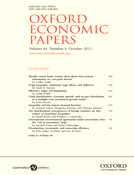
OXFORD ECONOMIC PAPERS-NEW SERIES
Illuminating trends and policies with scholarly precision.OXFORD ECONOMIC PAPERS-NEW SERIES is a prestigious academic journal published by Oxford University Press, dedicated to advancing the field of economics and econometrics. With an ISSN of 0030-7653 and an E-ISSN of 1464-3812, this journal has a rich history since its inception in 1938, and continues to play a vital role in disseminating impactful research through its convergence of years spanning from 1938 to 2024. Recognized as a Q2 journal in the 2023 category of Economics and Econometrics, it ranks #396 among 716 in its field according to Scopus, reflecting a commendable position within the academic community, particularly in global economic discussions. While the journal currently does not offer open access options, it remains committed to providing a platform for rigorous research and critical discourse. Researchers, professionals, and students will find the journal's articles to be essential reading, offering insights that are pivotal for understanding economic trends, policies, and methodologies. Its focus on high-quality scholarship ensures that contributions are both theoretically robust and practically relevant, making it a significant resource in the ever-evolving landscape of economic research.

Journal of the Economics of Ageing
Shaping Policies for Tomorrow's Ageing SocietyJournal of the Economics of Ageing, published by ELSEVIER, is a leading international journal dedicated to exploring the economic aspects of ageing in the global context. With an ISSN of 2212-828X, it aims to provide a platform for innovative research that addresses the socio-economic implications of demographic shifts, particularly those related to life-span and life-course studies. Since its inception in 2013, the journal has rapidly established itself within the Q2 category in both the Economics and Econometrics and Life-span and Life-course Studies fields, reflecting its significant contribution to these disciplines. Based in the Netherlands, this journal is indexed with a respectable percentile ranking, such as 69th in Life-span and Life-course Studies, confirming its value to researchers and professionals alike. Committed to disseminating impactful research, the Journal of the Economics of Ageing ultimately seeks to influence policy and funding decisions that shape the future of ageing populations.
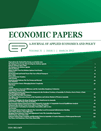
Economic Papers
Pioneering Thought in Economics, Econometrics, and Finance.Economic Papers is a prestigious journal published by WILEY, recognized for its contributions to the fields of economics, econometrics, and finance since its inception in 1982. With an impressive impact factor reflecting its scholarly influence, this journal is ranked in the Q2 category in the Economics, Econometrics, and Finance sector, placing it among the top 30% of journals in the field. The journal aims to disseminate high-quality research that addresses contemporary economic challenges, thereby advancing both theoretical understanding and practical applications. While currently not available as open access, Economic Papers provides vital insights for researchers, professionals, and students striving to deepen their comprehension of economic dynamics and contribute to sound policy-making. Scholars are encouraged to submit their work to engage with a robust academic community and impact the discourse in economic research.

Quantitative Economics
Catalyzing collaboration through accessible quantitative research.Quantitative Economics is a leading open-access journal published by WILEY, dedicated to advancing the field of economics through rigorous quantitative analysis. Established in 2010 and based in the United States, this influential journal boasts an impressive Q1 rating in the 2023 category of Economics and Econometrics, reflecting its high impact and quality within the field. With a Scopus ranking of #222 out of 716 in the Economics and Econometrics category, it sits comfortably in the 68th percentile, underscoring its relevance to researchers and professionals alike. The journal accepts a wide range of submissions, including original research articles, methodological advancements, and comprehensive reviews, which contribute to the understanding and application of quantitative methods in economic research. By providing immediate open access to all published articles, Quantitative Economics ensures that vital findings are readily available to academics, policymakers, and students across the globe, enhancing collaboration and innovation within the discipline.
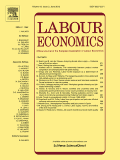
LABOUR ECONOMICS
Unpacking the Economics of Labor and Human ResourcesLABOUR ECONOMICS is a premier academic journal published by ELSEVIER, focusing on critical aspects of the labor market, employment, and human resource management from a rigorous economic perspective. With an impressive Q1 ranking in both Economics and Econometrics, as well as Organizational Behavior and Human Resource Management, this journal is renowned for publishing high-quality research that provides valuable insights into labor dynamics and workforce issues. Featuring an ISSN of 0927-5371 and an E-ISSN of 1879-1034, the journal has been a cornerstone of scholarly discussion since 1993, maintaining a commitment to excellence in the field. With its impact factor reflecting its relevance and influence, LABOUR ECONOMICS serves as an essential resource for researchers, professionals, and students eager to explore the intricacies of labor economics. The journal invites submissions that foster innovative discussion and advance knowledge within this vital area of study, providing a platform for groundbreaking research aimed at informed policy making and improved labor practices.

JOURNAL OF HUMAN RESOURCES
Uncovering strategies for effective workforce engagement.JOURNAL OF HUMAN RESOURCES, published by the University of Wisconsin Press, stands as a premier platform for the dissemination of cutting-edge research in the domains of economics, management, and organizational behavior. With an esteemed Impact Factor and ranking in the Q1 category across multiple disciplines, including Economics and Econometrics and Human Resource Management, this journal serves as a critical resource for academics, practitioners, and students alike, delving into vital issues and innovations in workforce management and organizational effectiveness. Since its inception in 1976, the journal has consistently provided invaluable insights that bridge theory and practice, thereby advancing the understanding of human resources within a global context. While the journal operates under a subscription model, it embraces a robust archiving strategy to ensure that its contributions are accessible and enduring. For those engaging with the Journal of Human Resources, it offers a rich tapestry of research that informs best practices and strategic developments, making it an essential read for anyone interested in the evolving landscape of human resources and organizational management.
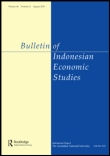
BULLETIN OF INDONESIAN ECONOMIC STUDIES
Exploring the Depths of Indonesian Economic DevelopmentBULLETIN OF INDONESIAN ECONOMIC STUDIES (ISSN: 0007-4918; E-ISSN: 1472-7234) is an esteemed journal published by Routledge Journals, Taylor & Francis Ltd, based in the United Kingdom. Since its inception in 1965, this journal has played a pivotal role in advancing the understanding of economic development within Indonesia and the wider Southeast Asian region. With an impressive impact, it holds a Q1 ranking in both Development and Economics and Econometrics categories for 2023, reflecting its influential contributions to the field. The journal is highly regarded for featuring empirical research, theoretical analyses, and policy discussions, consistently ranking among the top publications in social sciences and economics—placing it in the 92nd and 90th percentiles respectively. As a vital resource for researchers, professionals, and students, the BULLETIN OF INDONESIAN ECONOMIC STUDIES provides invaluable insights into economic issues, making it essential for those aiming to grasp the complexities of economic systems in Indonesia and beyond.
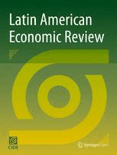
Latin American Economic Review
Illuminating Economic Pathways for the RegionLatin American Economic Review, published by CENTRO INVESTIGACION & DOCENCIA ECONOMICAS-CIDE, is a pioneering open-access journal that has been contributing to the field of economics since its establishment in 2014. With a focus on the diverse economic landscapes of Latin America, it aims to foster a rich dialogue among researchers, policymakers, and practitioners about pressing economic issues and innovative solutions. The journal, which holds an ISSN of 2198-3526 and an E-ISSN of 2196-436X, provides an accessible platform for the dissemination of high-quality research, reflecting a commitment to advancing knowledge in the realms of economics, econometrics, and finance. Though currently positioned in the Q4 category in Economics within Scopus rankings, it continues to evolve, providing valuable insights and fostering collaboration across various disciplines. The journal's open access model enhances its reach, allowing unrestricted availability of content to researchers and practitioners worldwide. As the journal converges through its second decade (2014-2024), it remains dedicated to promoting critical analysis and discussion on economic challenges and policies that affect the region and beyond.